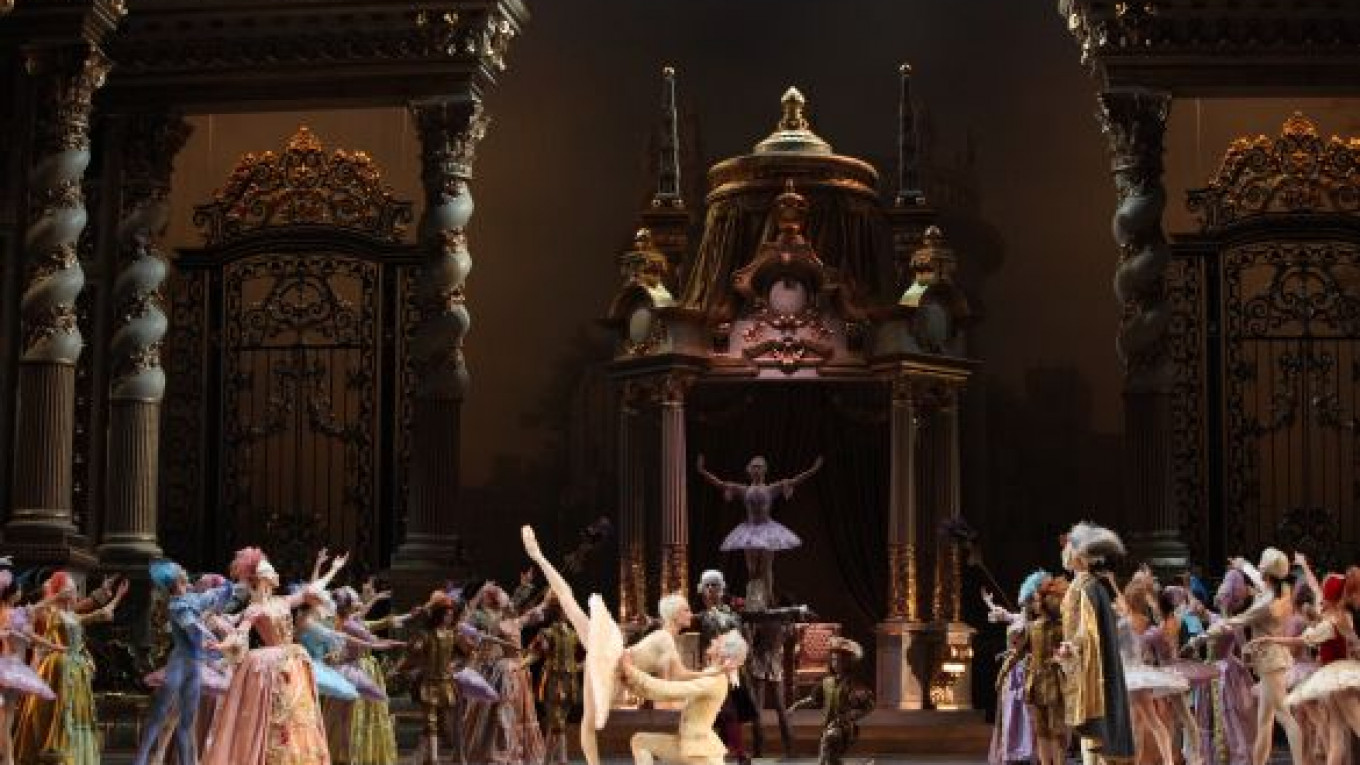Grandiose is the best one-word description I can come up with for the Bolshoi Theater's partly new production of Pyotr Tchaikovsky's ballet "Sleeping Beauty" that premiered in mid-November at the theater's newly reopened Main Stage.
The novel features of the production are the single-basic-set created by eminent Italian designer Ezio Frigerio and the array of lavish costumes designed by his wife, Franca Squarciapino. The action is firmly placed in the era of King Louis XIV of France, during whose reign – specifically, in 1697 – Charles Perrault wrote the tale on which the ballet is based.
The curtain opens on what look suspiciously like the gates to the Palace of Versailles. These quickly disappear to reveal what is certainly the most overwhelming stage picture in my experience at the Bolshoi and possibly the most overwhelming in the theater's entire history. Flanking the sides are enormous baroque colonnades, the rear of the stage is covered by the scene of a palace with a harbor on either side that might have come directly from the brush of the 17th-century French artist known as Claude Lorrain, and the stage floor is decorated with a pattern that seems to echo those created in modern times by Italian designer Gianni Versace.
Though quite stunning at first glace, it eventually seemed to me more than a little overdone. And it eventually ran into trouble when the ballet moved to the opening of the second act, which found Prince Désiré and his entourage conducting a hunt within the same palatial surroundings that had appeared before, with only a change of backdrop to suggest a forest.
Housed inside Frigerio's extravagant decor is a slightly revised version of the very same Grigorovich choreographic setting that audiences have seen at the Bolshoi for nearly four decades. Grigorovich's choreography generally follows that of Marius Petipa, who created the ballet for St. Petersburg's Mariinsky Theater in 1890, cutting half an hour or so from the original and making a number of significant changes, including a greatly expanded amount of dance accorded to Désiré.
The Grigorovich choreography is certainly seen to much better effect in its new decor than as performed up until the year before last with the rather tacky sets of Simon Virsaladze. And despite a few questionable moments, it seems to me the best to be found in any of the five ballets of Grigorovich that still, more than a decade and a half since the end of his 31-year tenure as Bolshoi ballet artistic director, form the backbone of the theater's classical repertoire.
The performance I saw earlier this month found the corps de ballet in its best Bolshoi form and most of the many solo parts danced in superior fashion.
Of special interest that evening was the appearance of invited soloist Yevgenia Obraztsova as Princess Aurora, a role new to her at the Bolshoi, but one she had already danced numerous times in other productions. A member of the Mariinsky's ballet troupe since 2002, Obraztsova first came to my attention in her wonderfully sensitive portrayal of the title role in the Mariinsky's reconstructed version of Petipa's "Ondine," for which she quite deservedly received a Golden Mask award five years ago. Since then, I have found much to admire in her frequent Moscow appearances, most notably as a guest artist the past two seasons at the Stanislavsky and Nemirovich-Danchenko Musical Theater.
Obraztsova's Aurora proved little short of ideal, combining a radiant stage presence with fluidity of movement and near-absolute precision. With her was Ruslan Skvortsov, as Désiré, who danced his part with elegance and virtuosity. And among the rest, I was particularly struck by the cleanly executed and ethereal Lilac Fairy of young soloist Olga Smirnova.
The success enjoyed by "Sleeping Beauty" over the past 122 years has been due in no small part to Tchaikovsky's glorious score, filled from beginning to end with some of the composer's enchanting melodies and marvelously attuned to the choreographic plan devised by Petipa. The Bolshoi performance I attended found conductor Pavel Klinichev in good command of the music and the theater's orchestra on its best behavior.
Watching "Sleeping Beauty," I thought back rather fondly to the more restrained and, to me, more tasteful decor and costumes of the production I witnessed two weeks earlier at St. Petersburg's Mikhailovsky Theater. But I have to admit that the Bolshoi's is certainly the sort of production that many, if not most, who come to the Bolshoi expect to see. As such, it seems assured of lasting success. And I would certainly recommend it as a spectacle well worth taking a look at, if perhaps only once.
No further performances of "Sleeping Beauty" appear on the Bolshoi schedule as currently announced through the end of May.
A Message from The Moscow Times:
Dear readers,
We are facing unprecedented challenges. Russia's Prosecutor General's Office has designated The Moscow Times as an "undesirable" organization, criminalizing our work and putting our staff at risk of prosecution. This follows our earlier unjust labeling as a "foreign agent."
These actions are direct attempts to silence independent journalism in Russia. The authorities claim our work "discredits the decisions of the Russian leadership." We see things differently: we strive to provide accurate, unbiased reporting on Russia.
We, the journalists of The Moscow Times, refuse to be silenced. But to continue our work, we need your help.
Your support, no matter how small, makes a world of difference. If you can, please support us monthly starting from just $2. It's quick to set up, and every contribution makes a significant impact.
By supporting The Moscow Times, you're defending open, independent journalism in the face of repression. Thank you for standing with us.
Remind me later.






